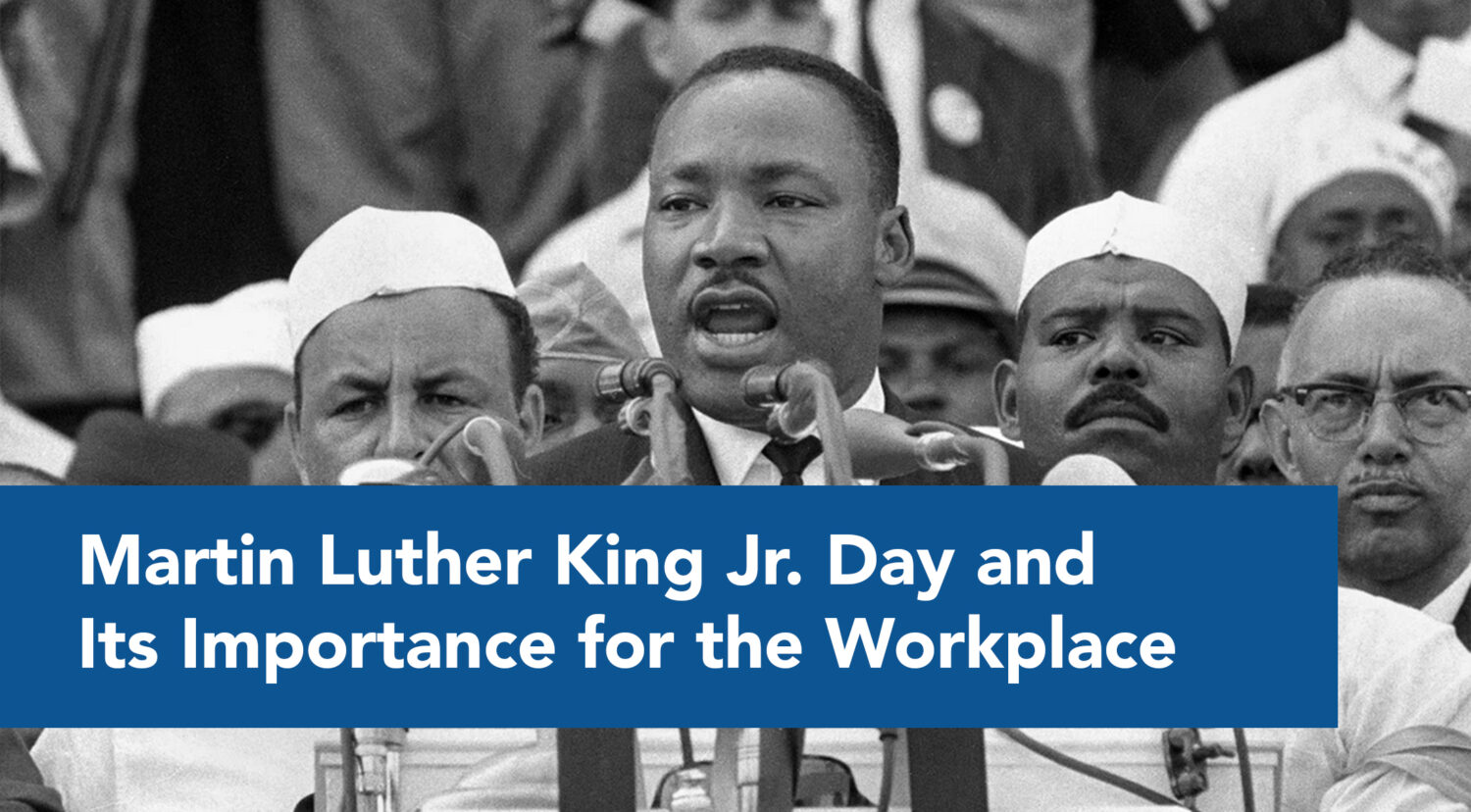

Hello my fellow HR practitioners,
As we celebrate Martin Luther King Jr. Day, we honor the life and legacy of a man who devoted his life to fighting for racial equality and justice. His vision of a more just and inclusive society continues to inspire people around the world.
MLK Day is not only a time to reflect on the progress we’ve made in the fight for civil rights, but also to recognize how much work still remains. For those of us in the human resources and compliance fields, it’s an important moment to renew our commitment to affirmative action and to consider how these policies support the values that Dr. King championed.
Aside: By the way, in case the term “affirmative action” causes a negative reaction with you, its use in business, especially for government contractors, is very different than you might think. There are no quotas in affirmative action for businesses. The emphasis is on equal opportunity, NOT equal results. As long as a contractor can show the business reason behind a hire or promotion or termination then they are okay. So keep good records!
A Little History of MLK Day
I won’t burden you with the history of Martin Luther King Jr. himself. That is well-known territory. But the history of the day commemorating him is interesting. You’ll see how it connects to human resources in a bit.
Almost immediately after his death in 1968—four days after, in fact—came the first calls in congress to dedicate a national holiday in his honor. A bill was was introduced by Michigan Representative John Conyers, a Black congressman. It didn’t pass. But Conyers kept resubmitting the bill year by year.
For various reasons, some racial, the bill continued to not pass until 1983. During the time between 1968 and 1983, however, many states and cities went ahead and celebrated MLK Day on January 15th, Dr. King’s birthday.
It wasn’t first observed as a national holiday until January 18, 1986, when President Ronald Reagan said in a speech,
“This year marks the first observance of the birthday of Dr. Martin Luther King, Jr. as a national holiday. It is a time for rejoicing and reflecting. We rejoice because, in his short life, Dr. King, by his preaching, his example, and his leadership, helped to move us closer to the ideals on which America was founded… He challenged us to make real the promise of America as a land of freedom, equality, opportunity, and brotherhood.”
The two words of Reagan’s to focus on from an HR standpoint are “equality” and “opportunity,” the very cornerstone of affirmative action in business, especially federal contractors and federal subcontractors.
The Connection Between MLK Day and Affirmative Action
When Dr. King spoke of a “promised land” where people would be judged by the content of their character rather than the color of their skin, he was calling for a world where every individual has equal access to opportunities, regardless of race, gender, or background. Affirmative action policies are one of the key tools we use to help move us closer to that vision.
Affirmative Action Plans (AAPs) are required for companies that do business with the U.S. government and their purpose is to ensure that discrimination does not occur and that qualified candidates from all backgrounds have the opportunity to compete for jobs. These plans are about leveling the playing field, making sure that no one is excluded because of their race, gender, disability, or other protected status.
As government contractors, companies are required to create and implement these plans, which include specific goals (not quotas!) for hiring, training, and retaining underrepresented groups in the workforce. Dr. King’s work laid the foundation for these policies, which aim to right the wrongs of systemic discrimination in hiring, promotions, and compensation.
How Affirmative Action Helps Keep MLK’s Dream Alive
While we’ve made significant progress since the Civil Rights Movement, it’s important to remember that workplace discrimination can still subtly creep into a work culture. Affirmative action programs are designed to address these issues head-on by enforcing proactive strategies to recruit and retain qualified diverse talent.
For government contractors, Affirmative Action Plans often include the following key elements:
- Recruitment: Proactively reaching out to underrepresented groups to ensure that they have equal access to job opportunities, i.e., that qualified individuals from particular groups are exposed to job listings or recruitment searches who ordinarily might not see those job postings or receive those recruitment calls and emails. This can include partnering with organizations that work with veterans, minorities, women, and individuals with disabilities.
- Training: Providing training programs and mentorship opportunities that encourage the development of underrepresented groups for leadership roles and professional growth.
- Monitoring and Reporting: Regularly reviewing the workforce composition to identify any disparities in hiring or promotions and taking corrective action where necessary.
By putting these policies into practice, contractors help create a more diverse and inclusive workplace, which benefits everyone. Studies have shown that diverse teams tend to be more innovative, productive, and better equipped to solve complex problems. This approach is aligned with Dr. King’s belief in the inherent value of every person, and it brings us closer to a world where people of all backgrounds have equal access to opportunities.
The Continued Need for Affirmative Action in 2025 and Beyond
Despite the progress that has been made, we still face significant challenges in achieving true equality in the workplace. For instance, there continue to be disparities in hiring rates and pay between white candidates and candidates of color, particularly for Black Americans. Dr. King understood that laws alone weren’t enough to guarantee equality; he recognized the need for systemic change that creates opportunities for those who have been historically excluded.
That’s why, even today, affirmative action remains a critical part of our strategy for creating more equitable workplaces. For government contractors, this means ensuring that their Affirmative Action Plans are not just a legal requirement but also a moral commitment to making Dr. King’s vision a reality.
What You Can Do
As an HR professional or government contractor, you can play an important role in making sure MLK’s message lives on in your workplace. Here are a few ways to align your affirmative action strategies with the values Dr. King stood for:
- Review Your Affirmative Action Plans: Ensure that your company’s AAPs are up-to-date, comprehensive, and actively being followed. If necessary, audit your hiring and promotion processes to uncover any hidden biases. (Shameless plug: We at HR Unlimited, Inc. are here if you need us. Reach out!)
- Engage in Outreach: Make sure your recruitment efforts actively seek out candidates from underrepresented groups, including women, minorities, veterans, and people with disabilities. Remember, there may be qualified potential candidates who simply didn’t see the job posting because it didn’t show up where these groups look for jobs. And one of those qualified individuals might just be your dream hire.
- Provide Mentorship and Career Development: Help create pathways for advancement for employees from underrepresented groups, ensuring they have the support they need to thrive in your organization.
- Foster an Inclusive Workplace Culture: In addition to meeting the legal requirements of your AAP, create a workplace culture where diversity is celebrated and where employees feel safe and supported, regardless of their background.
Conclusion
As we honor Martin Luther King Jr. Day, we’re reminded that the fight for equal rights and opportunities is ongoing. Dr. King’s vision of a world where individuals are judged by the content of their character, not the color of their skin, continues to inspire efforts to create a more inclusive society.
For federal contractors, affirmative action plans are one of the most important tools we have to make that vision a reality. By ensuring that everyone has access to equal opportunities, we can continue to build a workforce that reflects the diverse, vibrant society Dr. King dreamed of. Let’s carry his message forward by not just celebrating his legacy, but by actively working toward a future of equality, fairness, and opportunity for all.
Sources: Bhagat, Dhruti. “The Origins and Practices of Martin Luther King Jr. Day.” Boston Public Library, 2020. January 12. Britannica, 2025. January 7.
HR Unlimited, Inc. specializes in helping federal contractors and employers effectively meet their AAP and EEO compliance obligations. Please contact us to discuss any of your questions, concerns, or needs in this area.




